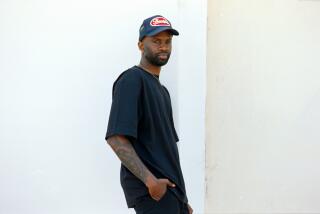Commentary : Amid Terror and Despair, a Teen-Ager Measures His Father’s Worth
- Share via
Father’s Day passes as just another day of the year for most of us, but no longer for me. It may not have Christmas presents or Thanksgiving turkey or birthday cake and ice cream, but it celebrates one thing we too easily take for granted--a living father.
Like most teen-agers whose lives are untouched by death, I had always thought of my father as invincible--immortal. But one night four years ago, all that changed.
As I lay in my bed, on the verge of sleep, I saw my dad pass my room. I assumed he was going to grab a midnight snack. Then, I heard the familiar low hum of the breathing machine, which aids asthmatics like my father in breathing. At first, I was not concerned because he uses the breathing machine two or three times a week and this usually stops the asthma he has suffered from since he was 2.
Then I heard him cry out. “Help!” he said in a voice choked with fear. I felt my heart race. I heard my dad call again, this time more desperately. Quickly, I jumped up and ran into the living room, where I saw my dad on one knee, his back hunched over, the breathing machine sticking out of his mouth. Then I noticed his face. It was ghostly white.
I have asthma myself and have experienced some attacks, but never like this. First, breathing is accompanied by a high-pitched whistling sound, and then, suddenly, the lungs shut and breathing is barely possible. Each breath is a major struggle and it feels as though death is certain. And sometimes--in extreme cases--it is.
I could see that my dad’s attack was an extreme case. And that he was in the biggest battle of his life. While my mom was on the phone, I watched my dad drop the breathing machine and fall to the floor unconscious. I tried to wake him up, but he did not respond. My mom rushed to him, put her arms around him and showered him with kisses. I could see her shaking, and my heart sank. I was only 15 at the time, but suddenly I felt helpless, numb and old beyond my years. My two brothers, who were then 13 and 17, entered the room. When they saw my dad lying unconscious, a look of terror crossed their faces.
The paramedics arrived five minutes later, but it seemed like five hours. Several men rushed through the door, and one began pushing my dad’s stomach. Another started an IV.
As they were attending to my dad, one man said, “He’s going down.” My mom, my two brothers and I thought they meant that my dad was dying. I ran into the bathroom, slammed the door and pounded my fists into the mirror. I felt like I had been an ungrateful son and that I had not done enough for him. Just the day before, I had gotten into an argument with him, and I had gone to bed without ever smoothing things over. Now he was going to die and the last thing he would remember about me was that I was a bratty and defiant son. These thoughts, as well as feelings of love toward my dad and worries of how difficult life without him would be, raced through my head.
I returned to the living room, and, with relief, heard a paramedic explain that when he said my dad was “going down,” he meant going down to the hospital. I was relieved, but the emptiness would not subside.
It was only later that night, in the hospital, when a doctor told us my dad would be fine, that I began to feel human again. Before, when I thought he was going to die, all I could think about was how great my dad was, how much he had done for me and how little I had done for him. Since that day four years ago, my attitude toward my dad has changed. Now, not only on Father’s Day but every day, I appreciate the love he has given me, and I cherish every moment we have together. I also give back to him all the love I can. Before his brush with death, I had not done enough to let him know how much I loved him. He now knows.
Today, as a young man, whenever I have difficulty expressing that love, I think back to the time I saw my dad lying in the hospital, semi-conscious and hooked up to tubes. The doctor said the medicine he was taking had made him delirious. As we were about to leave, I heard my dad say, “Scotty, I always loved you, Scotty.” Even though the doctor said my dad did not know what he was saying, I knew that he did. I burst into tears and said: “I love you too, daddy.”


